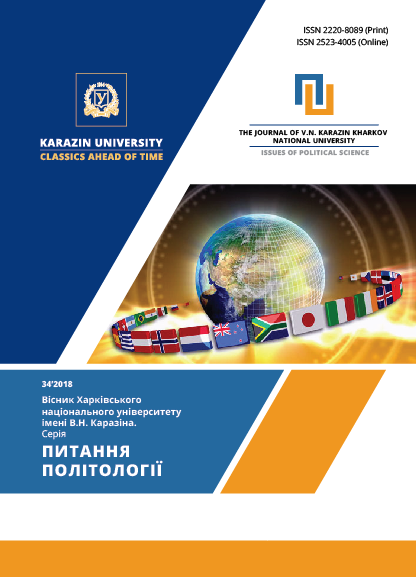THE PLACE AND ROLE OF NON-GOVERNMENTAL ACTORS IN POST-CONFLICT PEACEBUILDING IN UKRAINE
Abstract
The general theoretical approaches to the classification of actors in post-conflict peacebuilding, such as Lederach, Cambell and Hartnett, are analyzed, depending on approaches to understanding the concept of "post-conflict peacebuilding". The concepts of divided actors based on the region of work, the degree of their inclusion, the dominant sphere of activity and the nature of the methods used by the actors were considered. Attention is focused on the analysis of various approaches to the segregation of actors into specific clusters and their work within the conflict in Ukraine, according to regional peculiarities. The problems of the actors' work are systematized and analyzed. The necessity of applying an integrated unifying classification of post-conflict peacebuilding actors is indicated to identify the most effective strategies for their interaction.
Particular attention is paid to the adaptation of the classifications of actors to the modern context of the Ukrainian armed conflict. The role of non-governmental actors in the peacebuilding process and the possibility of considering them as the main actors of this process in Ukraine are analyzed. The main problems that may interfere with the effective work of non-governmental organizations are described. The functions performed by non-governmental actors and the prospects for their further work, as well as the methods that actors use to build the world, are highlighted. Organizations of different levels and areas directly working in the sphere of peace-building in Ukraine today are analyzed. The specific problems arising in Ukraine in the work of non-governmental organizations in the field of post-conflict peacebuilding are analyzed. Prospects for further research of the chosen topic are formed.
Downloads
References
Barnett, Michael. 2007. “Peacebuilding: What Is in a Name?ˮ, Global Governance 13: 35-58
Confronting War: Critical Lessons for Peace Practitioners. 2003 (edited by M. B. Anderson, L. Olson, K. Doughty). The Collaborative for Development Action.
Aryal, A. 2012. Theories of Change in Peacebuilding: Learning from the Experiences of Peacebuilding Initiatives in Nepal, CARE.
Alif, S. M. 2014. “Peace building in post – war societiesˮ, Journal of Social Review 2 (1): 31-44.
Campbell, S. P. and Hartnett, Michael. 2005. “A Framework for Improved Coordination: Lessons Learned from the International Development, Peacekeeping, Peacebuilding, Humanitarian and Conflict Resolution Communities. URL: https://www.regjeringen.no/globalassets/upload/ud/vedlegg/missions/framework.pdf (дата звернення 12.11.2018).
Paffenholz, T. 2014. “International peacebuilding goes local: analysing Lederach's conflict transformation theory and its ambivalent encounter with 20 years of practiceˮ, Routledge 2. №1: 11-27.
Maiese, M. 2003. “Midlevel Actorsˮ. URL: https://www.beyondintractability.org/essay/midlevel-ngos-gos (дата звернення 1.11.2018).
Clapham, A. 2009. “Non-state Actors (in Postconflict Peace-building)ˮ. POSTCONFLICT PEACE-BUILDING: A LEXICON, Vincent Chetail, ed:, Oxford University Press: 200-212.
URL: https://is.gd/pMYfqv (дата звернення 10.10.2018).
Wagner, M. 2009. “Non-State Actorsˮ. URL: https://www.researchgate.net/publication/308874846Non-State_Actors (дата звернення 10.11.2018).
Forster R. Report No. 36445-GLB 2006. Civil Society and Peacebuilding Potential, Limitations and Critical Factorsˮ. URL: https://is.gd/T3xnZC (дата звернення 5.11.2018).
“Стратегія участі Церков і релігійних організацій у миробудуванніˮ 2017. Україна – наш спільний дім. URL: http://vrciro.org.ua/ua/ documents/ 535-uccro-peacebuilding-strategy-ukraine (дата звернення 1.11.2018).
Філіпчук, В. 2016. “Міжнародна миротворчість та війна на Сході України: чи є точки дотику?. URL: http://icps.com.ua/assets/uploads/images/images/eu/t_mirotvorchista5.pdf (дата звернення 10.11.2018).
Про Програму розвитку ООН в Україні, ПРООН України. URL: http://www.ua.undp.org/content/ukraine/uk/home/about-us.html (дата звернення 1.11.2018).
Author’s copyright and licensing.
License Terms: Authors retain copyright and also grant the Journal the right to publish original scientific articles that contain research results and are not under consideration for publication in other issues. All material is licensed under a Creative Commons Attribution License International CC-BY, which allows others to distribute their work with the copyright of this work and recognition of the first publication in this Journal.
If the article is taken for publishing in The Journal of V.N. Karazin Kharkiv National University. “Political Science Issues”, the author must sign a copyright transfer agreement. The agreement is sent by post (original document) or by e-mail (scanned copy of the document) to the Editorial Board of the Journal.
By this agreement the author certifies that the submitted material:
- does not violate the copyrights of other people or organizations;
- has not been previously published in other issues and has not been given for publishing to other issues.
The author gives the editorial board the rights to:
- publish the article in Ukrainian (English) and distribute its printed version;
- translate the article into English (for articles in Ukrainian) and distribute the printed version of the translation;
- distribute the electronic version of the article, as well as the electronic version of the English-language translation of the article (for articles in Ukrainian and Russian), through any electronic means (placing on the official journal web site, in electronic databases, repositories, etc.).
The author reserves the right without the consent of the editorial board and the founders to:
- Completely or partly use the materials of the article for educational purposes.
- Completely or partly use the materials of the article for writing own theses.
- Use the materials of the article to prepare abstracts, conference reports, and oral presentations.
- Post electronic copies of the article (including the final electronic version downloaded from the journal's official website) to:
- personal web-resources of all authors (web sites, web pages, blogs, etc.);
- web-resources of institutions where authors work (including electronic institutional repositories);
- non-profit, open-source web resources (such as arXiv.org).




